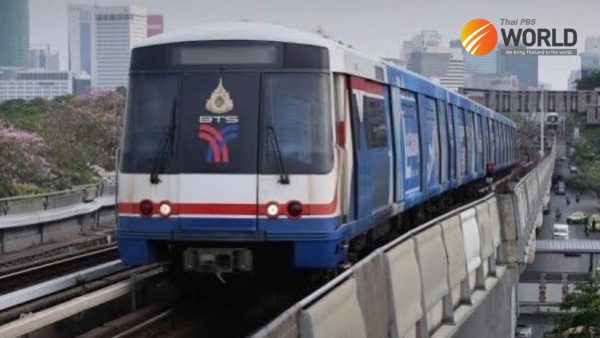A mother who beats Thai’s education failure

Salinee Geasee, a native Thai speaker, successfully teaches her children to become bilingual kids. She started to speak English with them when they were 8-month-old, by talking to them only in English every single day. Now Sornsawan Geasee, 5-year-old and her younger brother, Thianravit Gaesee, 3, can verbally communicate in English fluently.
A mother-of-two decided to enroll her children in Pei-ing Chinese school, rather than an English progamme or International school. Despite studying at a private school, the tuition fee cost around ฿10,000 a semester, incredibly cheap comparing with other private bilingual schools.
“I don’t send my kids to international school because of economic reasons, and I think we do not want our kids to further their studies in international schools as different system of teaching. If they further their studies in Thai, then the different system will cause them problem. When they want to go for higher education from primary school to high school, it is going to be a little bit difficult. And even you don’t send your kids to the international school there are some many ways to put the language learning ability into them”, Salinee said.
She admitted that she did not expect her children to become excellent in English. She had hoped that they would get familiar and have fun when learning the language, “I just wanted to set them the good attitude, then they would be open-minded to learn and if they feel that they can do it, that would boost their self-esteem. ”
– Thai’s education failure –
Thailand education system has been in crisis for years, which has resulted in reduced national competitiveness. In every international education test, Thai students show very low proficiency in most subjects.
For instance, Thailand was placed 74th out of 100 countries in 2019 in the EF English Proficiency test, organized by Education First. The very poor performance by Thai students means the country ranks third from the bottom for English proficiency among ASEAN nations.
When asked the reason why she decided to teach her children by herself, rather than left this job to the teachers, she said, “it’s because I can’t 100% rely on education system in the school. When I studied in the lower secondary level, I taught myself speaking and listening skills. Then I could verbally communicate in English when I was 16-17-year-old, despite studied the language at very young age. So, it already proved to me that Thai’s education system is unreliable. If a student cannot speak English, it is not his or her fault, then whose fault? The falling question is whose fault.”
Salinee pointed out the factors that make the majority of Thai students who learning English in schools fail to use the language verbally, firstly children do not have enough time to practice.
“Supposedly, in a 50-minute class, they spend 40 minutes on grammar, what about the other 10 minutes? You must understand that if you learn alien language or any other languages that you are not familiar with, you have to take time and have to do it every day. You also have to wait until the result turn out, but most Thai schools stick to their curriculum which is designed or assigned by the government and tend to focus more on grammar.
Secondly, the quality of teachers. She mentioned the fact that most primary teachers have to deal with, “I don’t blame that teachers are not good or not competent. As you knew that primary teachers have to teach every subject, therefore their competency will be like a duck. They can touch this and that, they can touch things superficially, but are unable to go deep in details. That’s why most of primary students cannot speak or pronounce English correctly.”
– Speech delay –
Most parents concern about language delay in their bilingual or multilingual children, including Salinee. She experienced this problem when her elder daughter is around one year of age. It worried her and she had to seek advise form speech therapist. However, bilingualism itself doesn’t cause speech delay.
According to Dr. Suriyadeo Tripathi, delay language is not a barrier for the bilingual or multilingual children, “in medical side we found out that most of the multilingual children have very high intelligence scale, not in the speech delay. What we concern about the multilingual the linguistic might be the language, because when you use it you not loss it, but if you do not use it you will losses it. I mean that language is using for listening, reading, speaking not for grammar, nor teaching for examination, this is the core objective. Multilingual does not cause delay speech, on the other hand they show strong power to access information easily and might be high intelligence than those monolingual” said the Pediatrician and Director of National Institute of Child and Family Development.
– The power of parents –
Dr. Suriyadeo emphasized on the important of family, which is the most influential and very more valuable than school. “First of all we concern about the bio ecology of human development If you look at the bio ecology of the human development, every kid have their immediate environment, which we called the micro system. Micro system not only mean school, it is also meaning family and the direct biological parents, who are their very most influencers. Even if you send your kids to expensive school, does not mean that you will ignore your kids. You have to spend your time, very quality of time together in your home”.
Likewise, Salinee said she wanted to tell all the parents that they play very important role in their children’s learning. “Parents help matter in every subject and especially every skill. I mean in discipline or the way they can deal with their life and if they face difficulties in their life in future, is based on family. So, no matter what you want to teach your kids, not only in English we need to teach them when they are very young, it’s going to be very effective.”
Many parents see Salinee as a role model, yet they are unable to teach their kids to speak English like her does. She suggests useful tips for parents; the principal of substitution. “You have to substitute Thai sentences with English sentences, do it like two sentences a day is okay for a start. Then you improve yourself to speak more and substitute it, do the substitution and you will be able to speak more and more English every day. You don’t need to be perfect to speak English to your kids, not necessarily. Just start with the first sentence and it will lead to the second sentence, later the second sentence will lead to the third sentence.”






